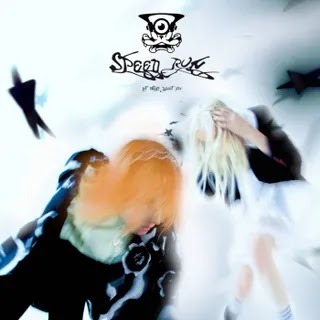The Swedish electro-pop group’s first album for Ninja Tune is a welcome departure, finally infusing their own studio work with the creative energy of their collaborative sessions.
The knock on Little Dragon has long been that their best work happens on other artists’ albums. Perhaps that’s an unfair standard to hold them to: After all, their collaborators tend to be some of the world’s most creative and forward-thinking artists, like Flying Lotus, Damon Albarn, and Dave Sitek, to name just a few. It might be their skillful use of negative space that pairs so well with such different compositional styles; maybe it’s the ultra-fine grit of Yukimi Nagano’s voice that serves as such an alluring foil for others to create their best work. But with a few exceptions, their most memorable songs have not been their own.
On their own records, Little Dragon’s tendency to retread the retrofuturist aesthetic they’ve refined over the last 15 years has left much of their output feeling flat and uninspired. Part polished Brit R&B, part Swedish electro-pop, there’s an easy listening vibe to their oeuvre—think hi-fi beats to relax and study to—that feels like a waste of the potential they flashed on 2009’s Machine Dreams. But their new LP, New Me, Same Us—their first full-length for London’s Ninja Tune—is a welcome departure from their somewhat staid studio sessions, finally infusing their own work with the creative energy of their collaborations.
New Me, Same Us doesn’t completely abandon their usual toolkit. Little Dragon still strike a delicate balance between the organic and the electronic, the danceable and the downtempo. They are at their best when they loosen up, forsaking technical precision in favor of a more free-flowing funk—led by Fredrik Wallin’s bass—that lets Nagano’s husky R&B vocals flow most naturally. Album standout “New Fiction” bottles this natural alchemy: Nagano’s voice and Wallin’s bass perform an elegant duet on the verses, intertwined like dance partners who’ve been waltzing together for years. And when Wallin is given free rein on the grand piano on the bridge, pummeling the high keys in a rare moment of unbridled expression, the band achieves a high-water mark that feels years in the making, injecting raw unpredictability into a sound typically defined by its slick studio sheen.
In that sense, “New Fiction” is a bit of a tease; the rest of New Me, Same Us is relatively restrained. And while the record’s press materials tout the album as the band’s “most collaborative” yet, the creative exchange is mostly internal—the sole feature comes from Kali Uchis on “Are You Feeling Sad?”, a welcome if brief addition to the record’s tonal palette. But there’s evidence that their years assisting other artists, for so long an albatross they’ve sought to shed, have finally left an impression. “BULLETS,” their collaboration with Kaytranada, was one of 99.9%’s standouts, infusing Little Dragon’s glossy funk with Caribbean soul. The impact he made is evident from the first few minutes of New Me, Same Us, from the syncopated four-on-the-floor beat on “Hold On” to the jazzy swing of “Are You Feeling Sad?”, and even in the way Nagano’s voice fills the gaps left by the rhythm section on “New Fiction.” Their wider influences are also laid bare, to positive effect. They credit Massive Attack as a sonic ancestor to “Hold On,” and it’s easy to hear how Little Dragon’s swirling synths and clacking woodblock mirror the synthesized strings and staccato percussion of “Unfinished Sympathy.”
Historically, Little Dragon albums have felt like collections of a band’s earnest attempts to find their groove, defined more by their failure to spark the magic than the few moments when they achieve it. And while New Me, Same Us is not entirely free of woe—the melancholy melody on “Every Rain” oozes existential ennui—for the most part, they sound like they’re having more fun than ever. Fifteen years in, they seem to have turned a corner, feeding off some of the inspiration that helped them stand out on other artists’ records. Perhaps they’ve finally discovered that they had as much to gain from their peers as they’ve been giving.
View the original article here




%20Music%20Album%20Reviews.webp)











0 comments:
Post a Comment